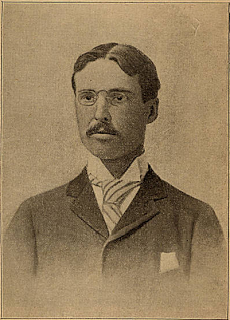Carlyle Harris

Carlyle Harris was a notable figure in the late 19th century, primarily known for his involvement in a highly publicized murder case that led to significant discussions about ethics in medicine, the use of pharmaceutical drugs, and the legal system of the time. His case is often cited in studies related to forensic science, legal history, and the sociology of crime and punishment.
Background[edit]
Carlyle Harris was a young medical student in New York City during the late 1800s. His life took a dramatic turn when he became romantically involved with Helen Potts, a young woman from a well-to-do family. Their relationship, initially hidden from Potts' family, eventually led to a secret marriage. The controversy surrounding Harris primarily stems from the subsequent death of Helen Potts, which was attributed to poisoning by morphine.
The Case[edit]
The case against Carlyle Harris began after the sudden and mysterious death of Helen Potts, who was found dead under suspicious circumstances. An autopsy revealed the presence of a lethal dose of morphine in her system. Harris was accused of poisoning Potts, allegedly having administered the morphine under the guise of headache pills. The prosecution argued that Harris's motive was to rid himself of Potts so that he could pursue other romantic interests, highlighting his alleged affairs with other women.
Trial and Execution[edit]
The trial of Carlyle Harris was a sensation, capturing the attention of the public and the press alike. Harris's defense argued that Potts might have accidentally overdosed or taken her own life, but the evidence, as presented by the prosecution, swayed the jury. Harris was found guilty of murder and sentenced to death. His execution, carried out in the electric chair, was a landmark event, further sensationalizing the case and sparking debates over the death penalty, the ethics of punishment, and the role of the media in the judicial process.
Legacy[edit]
The Carlyle Harris case left a lasting impact on several fronts. It highlighted the need for more stringent regulations in the prescription and distribution of pharmaceutical drugs, leading to reforms in the medical and pharmaceutical industries. Additionally, the case is often discussed in the context of the death penalty and its application, particularly in cases with significant public and media involvement. The role of the press in shaping public opinion and potentially influencing the outcome of legal proceedings was also a point of contention and discussion following the trial.
See Also[edit]
- Forensic science
- Legal history of the United States
- Sociology of crime and punishment
- Ethics in medicine
Ad. Transform your life with W8MD's Budget GLP-1 injections from $75


W8MD offers a medical weight loss program to lose weight in Philadelphia. Our physician-supervised medical weight loss provides:
- Weight loss injections in NYC (generic and brand names):
- Zepbound / Mounjaro, Wegovy / Ozempic, Saxenda
- Most insurances accepted or discounted self-pay rates. We will obtain insurance prior authorizations if needed.
- Generic GLP1 weight loss injections from $75 for the starting dose.
- Also offer prescription weight loss medications including Phentermine, Qsymia, Diethylpropion, Contrave etc.
NYC weight loss doctor appointmentsNYC weight loss doctor appointments
Start your NYC weight loss journey today at our NYC medical weight loss and Philadelphia medical weight loss clinics.
- Call 718-946-5500 to lose weight in NYC or for medical weight loss in Philadelphia 215-676-2334.
- Tags:NYC medical weight loss, Philadelphia lose weight Zepbound NYC, Budget GLP1 weight loss injections, Wegovy Philadelphia, Wegovy NYC, Philadelphia medical weight loss, Brookly weight loss and Wegovy NYC
|
WikiMD's Wellness Encyclopedia |
| Let Food Be Thy Medicine Medicine Thy Food - Hippocrates |
Medical Disclaimer: WikiMD is not a substitute for professional medical advice. The information on WikiMD is provided as an information resource only, may be incorrect, outdated or misleading, and is not to be used or relied on for any diagnostic or treatment purposes. Please consult your health care provider before making any healthcare decisions or for guidance about a specific medical condition. WikiMD expressly disclaims responsibility, and shall have no liability, for any damages, loss, injury, or liability whatsoever suffered as a result of your reliance on the information contained in this site. By visiting this site you agree to the foregoing terms and conditions, which may from time to time be changed or supplemented by WikiMD. If you do not agree to the foregoing terms and conditions, you should not enter or use this site. See full disclaimer.
Credits:Most images are courtesy of Wikimedia commons, and templates, categories Wikipedia, licensed under CC BY SA or similar.
Translate this page: - East Asian
中文,
日本,
한국어,
South Asian
हिन्दी,
தமிழ்,
తెలుగు,
Urdu,
ಕನ್ನಡ,
Southeast Asian
Indonesian,
Vietnamese,
Thai,
မြန်မာဘာသာ,
বাংলা
European
español,
Deutsch,
français,
Greek,
português do Brasil,
polski,
română,
русский,
Nederlands,
norsk,
svenska,
suomi,
Italian
Middle Eastern & African
عربى,
Turkish,
Persian,
Hebrew,
Afrikaans,
isiZulu,
Kiswahili,
Other
Bulgarian,
Hungarian,
Czech,
Swedish,
മലയാളം,
मराठी,
ਪੰਜਾਬੀ,
ગુજરાતી,
Portuguese,
Ukrainian
